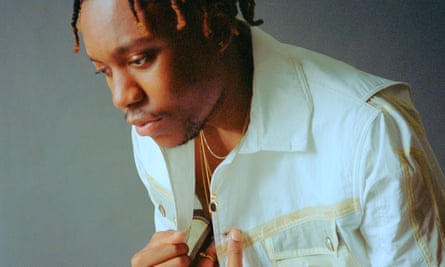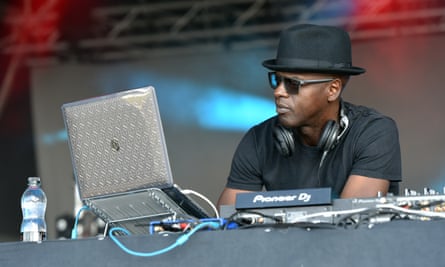Trevor Nelson, the veteran DJ and broadcaster, has said R&B remains the hardest music to sell in the UK, with artists still struggling to make their mark, and some turning to the US for chart success.
Nelson remembers jumping up and down every time a British R&B act made it into the charts during his pioneering BBC Radio 1 show in the 90s and 00s. “I was sort of saying to myself: ‘I know this is a one off’,” Nelson said. “That’s the music [R&B] I love the most, and it’s probably the hardest music to sell in this country. It just is. It’s always been.”
His beloved genre has been thrust back into the spotlight after criticisms of this year’s Brit awards, which take place on Saturday, for failing to nominate any R&B artists in its combined pop and R&B category or any other leading categories (the only exception is the R&B group Flo, who won the Brits rising star award last December).
For Nelson, the omission raises questions about why British R&B has failed to take off in a country where other forms of black music, such as grime and drill, have broken through what was once thought to be impenetrable barriers.
Carlyn Calder, the founder of the independent record label Vibeout, said when she started in the music industry 10 years ago, there was little enthusiasm to push R&B music in the UK. “It got me really frustrated at times because I would meet the most talented songwriters and producers from the UK and their talent was overlooked.”
Some, like Ella Mai, turned to the US with great success. In 2018, she became the first UK star to top the US R&B singles chart since 1992.
But things have quietly changed over the past few years in the UK, Calder added, with British R&B artists flourishing and selling out shows.
Well-established artists such as Jorja Smith, who Nelson describes as a “generational talent”, Mabel and Raye have been able to build on their huge commercial success.
Others pointed to Mahalia and Tiana Major9, both of whom were picked by Adele to perform at her Hyde Park show in 2022, and Cleo Sol, Jvck James, Bellah, Scribz Riley, Shaé Universe, as well as groups such as Flo and Children of Zeus, who have racked up significant streams online, as proof the genre is not only thriving, but reaching new heights.
This has only been possible, industry experts say, as a result of work done by an emerging underground scene to support and develop artists. The lack of interest from industry leaders led to a “DIY boom” a decade ago, with people starting their own R&B labels and management companies, while artists did as much as they could themselves.
Jvck James, who is featured in Apple music’s Up Next programme was signed by Calder after she heard his songs on SoundCloud. He describes his setup at home, with a studio mic and other equipment, as a privilege. “I like to work by myself. So when I put my head down, I can really lock in and create something magical,” he said. “I’ve been lucky enough not to have pressure from any label telling me what to do, telling me how I should make my music.”

Some criticised what they felt to be the shortsighted nature in developing emerging R&B artists. “What can be quite frustrating is that you hear someone come out with a song and they never ever get an opportunity to grow if the follow-up song doesn’t necessarily take off as the first song did,” the artist manager Nathan Burke, who represents Cleo Sol and the producer Inflo, said. “It may not take off straight away, but you keep developing and over time, when you see that return on investment, everyone’s going to win.”
While the critically acclaimed artist Neo Jessica Joshua, better known as NAO, agreed that R&B “is probably one of the hardest to break into” in the UK, the genre continues to do well internationally.
NAO, whose second album, Saturn, was nominated for a Grammy in 2020, added: “I have a massive fanbase in America. They really understand British R&B and they really love it because it doesn’t sound like the R&B that they know. We’ve got our own flair and twist.”
David Orelaja, who manages Tiana Major9, said the internet had allowed British R&B artists to have access to audiences across the world at their fingertips. “Spotify, Amazon, Apple Music or Tidal, these massive platforms are backing UK R&B. They’re putting us in the same world, on the same platform, and on the same playlist as a lot of the artists that we look up to. It just made it a lot easier and shows there’s definitely an audience for it: people want it.”
DJ Ace, who presents BBC Radio 1Xtra’s R&B show, said while R&B had been ignored in the UK, executives in the US were taking notice of recent talent. “I’ve just come back from LA and everybody was talking about UK R&B, which blew my head. Over here, R&B artists are struggling to get heard and noticed.”
There was excitement among managers, artists and DJs for the year to come, particularly with the success of records such as SZA’s. DJ Ace is preparing to take a group of artists, including Jaz Karis, James Vickery, Kadeem Tyrell, and Mnelia, to this year’s SXSW festival in Austin, Texas.
“I think this year is gonna be absolutely phenomenal,” DJ Ace said. “There’s a global audience that really wants to hear us and the UK scene is so attractive.”

